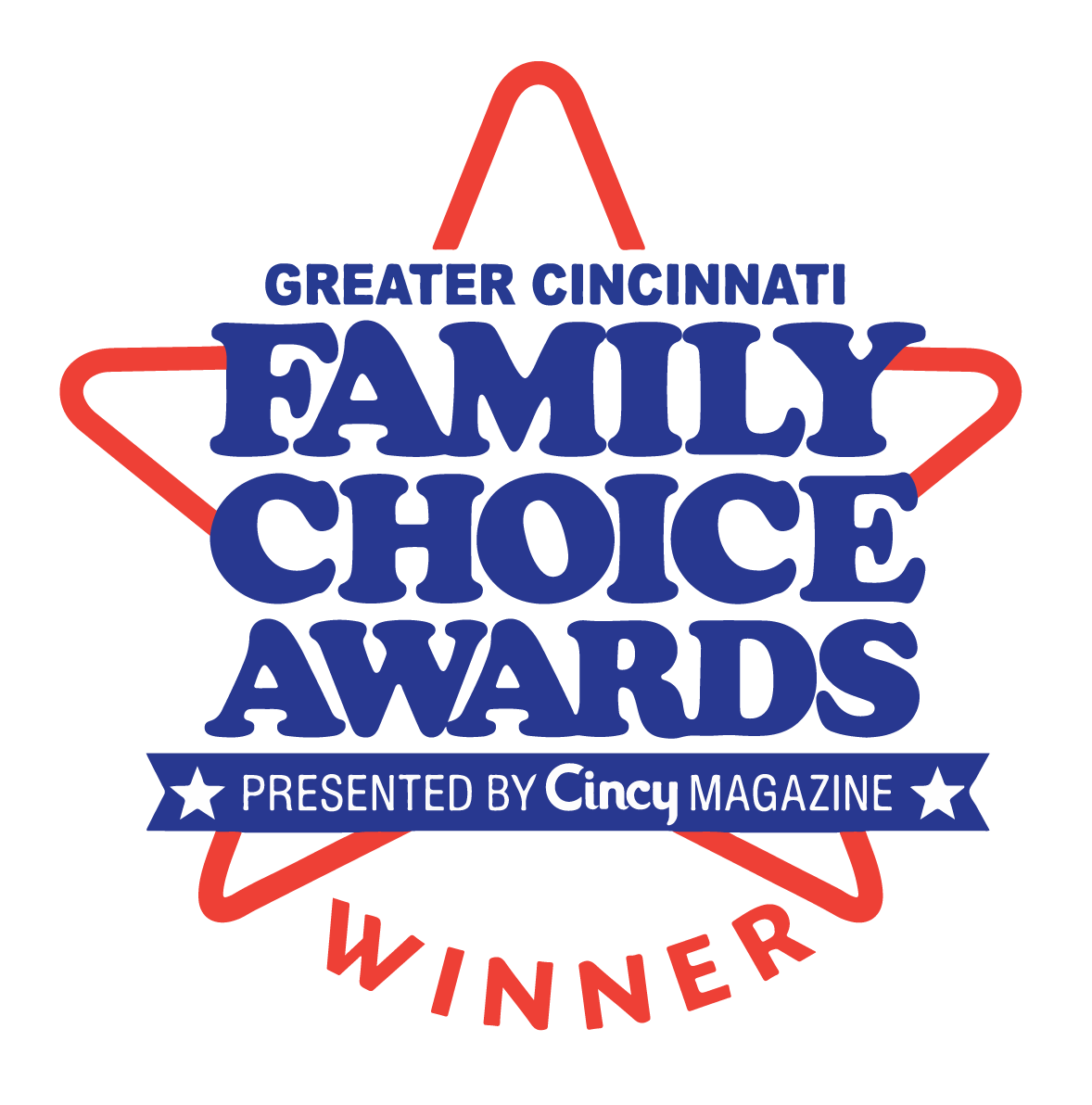Campus Security
At Southern State, we are committed to campus security. With various campus policies and procedures, training exercises, and on-campus security, we strive to create the safest space possible for our students, staff, faculty, and community. Our security team is staffed with officers from Hillsboro and Mt. Orab Police Departments.
We're proud of our close working relationships with the Hillsboro and Mt. Orab Police Departments and other federal, state, and local law enforcement agencies.
Contact Security
- Emergency
- 911
- Non-Emergency
- Gary Heaton
- Security and Emergency Response Coordinator
- 937.393.3431 Ext. 2673
- gheaton@sscc.edu
Collin's Law: Anti-Hazing Act
Southern State Community College (SSCC)
Reported Time Periods: 2017 through 2025 (Dec. 31)
SSCC prohibits Hazing in the Student Code of Conduct.
SSCC is committed to ensuring safety on its campuses. It is important to maintain environments where students, employees, and guests feel safe, secure, and welcomed. The College acknowledges that a part of the higher education experience is participation in various extra- /co-curricular groups and organizations with different purposes and processes for affiliation. The College supports traditions within organizations that match the College's core values. Hazing is antithetical to the College's mission and has no place.
Definition of Hazing:
The College defines Hazing as an act that endangers the mental/physical health or safety of a student, employee, or guest, or destroys/removes public/private property. It also includes actions for the purpose of initiation, admission into, affiliation with, or as a condition for membership status in a group or organization.
Status of Hazing Incidents:
2025 (Jan. 1 - Dec. 31)
No incidents of hazing violations have occurred for this calendar time period.
2017-2024
Southern State Community College is able to report no incidents of hazing violations have occurred for the recent 7-year period of 2017 through 2024.
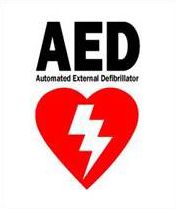 Automated External Defibrillators (AEDs) are located throughout the campus.
Automated External Defibrillators (AEDs) are located throughout the campus.
AEDs are emergency medical devices used when a person is experiencing cardiac arrest, delivering an electrical shock designed to return the heart to its normal rhythm. Southern State maintains a number of these devices in fixed locations on each campus, as indicated on the campus layouts below.
How an AED Works
Once turned on, prompts appear that guide AED users through the process. One of the initial prompts instructs the user to connect the AED to the victim by placing adhesive pads on the victim's chest.
The AED analyzes the victim's heart rate to determine if a shock is needed. If the AED unit does not detect an abnormal heart rhythm, it will not deliver the shock. If a shock is needed, the AED will prompt the user to press a button that will deliver the shock.
Please contact Gary Heaton at gheaton@sscc.edu with any questions.
AED Plus Training Videos
The ZOLL® AED Plus® defibrillator supports rescuers responding to sudden cardiac arrest. Our Real CPR Help® technology provides real-time audio and visual feedback on CPR compression rate and depth to guide rescuers in performing high-quality CPR. Learn how to operate the AED Plus defibrillator with our instructional training videos.
Step by Step Demo (AHA)
In a Rescue (AHA)
Real CPR Help Demo
Maps
Central Campus | Hillsboro, OH
Main Building
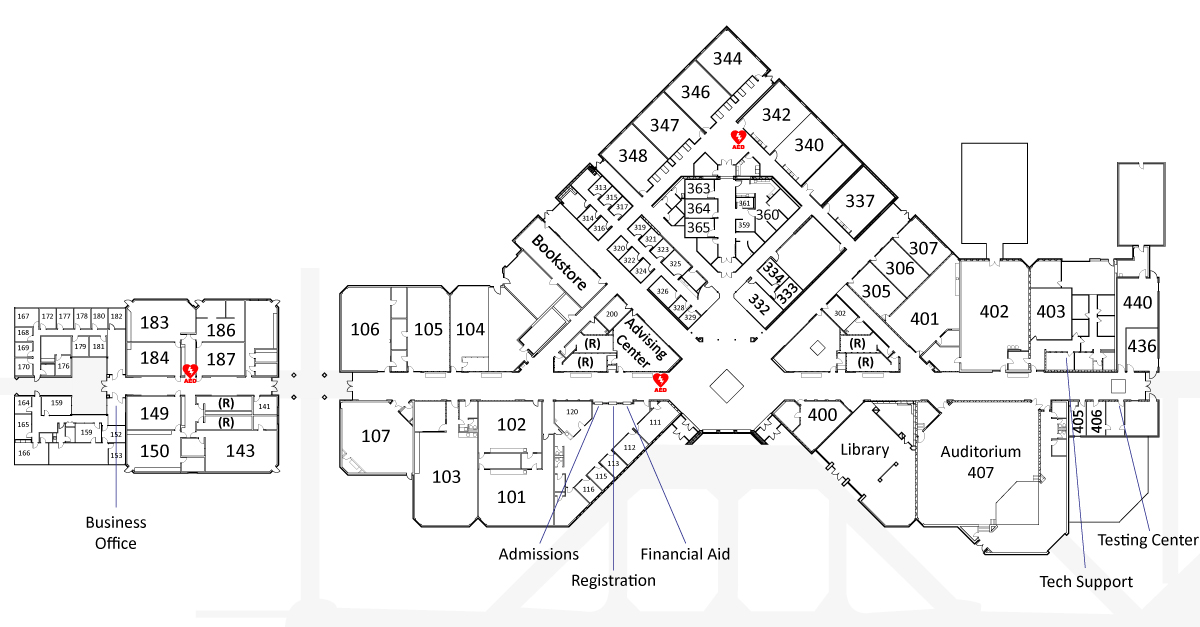
Patriot Center
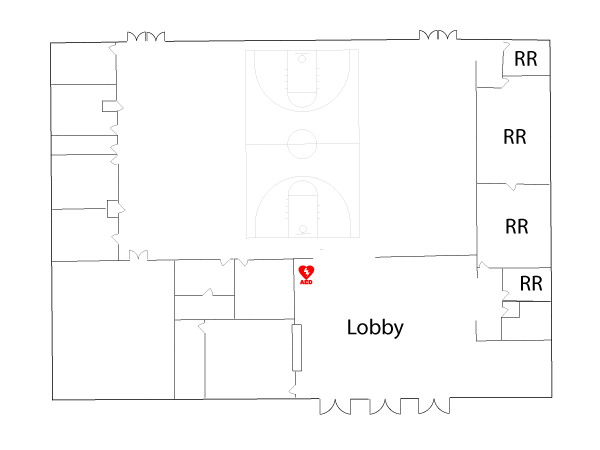
Adult Opportunity Center
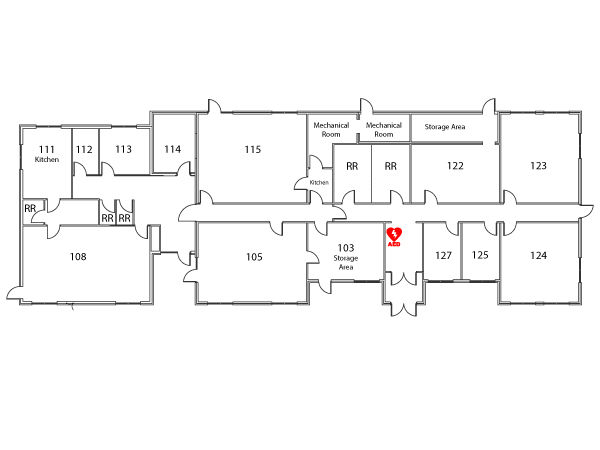
Brown County Campus | Mt. Orab, OH
First Floor
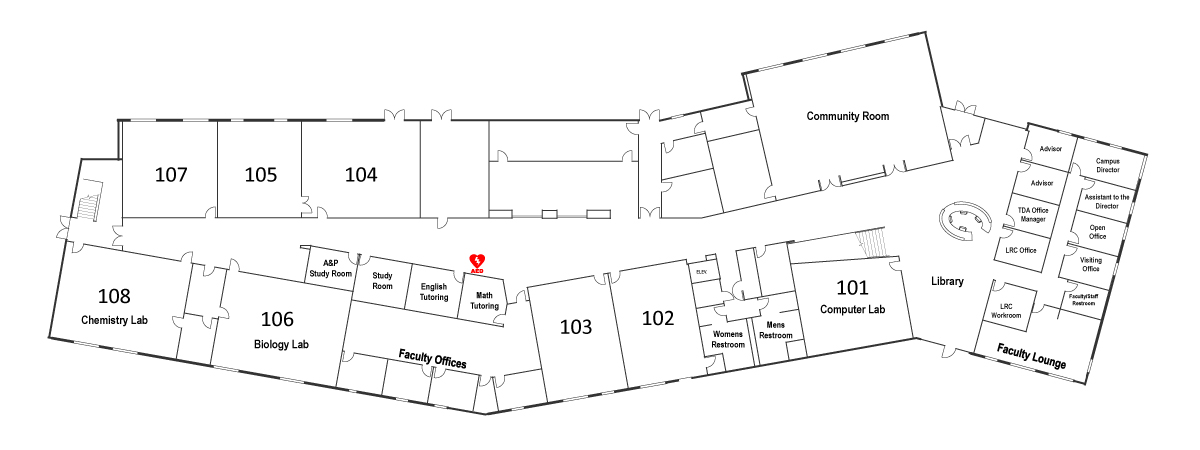
Second Floor
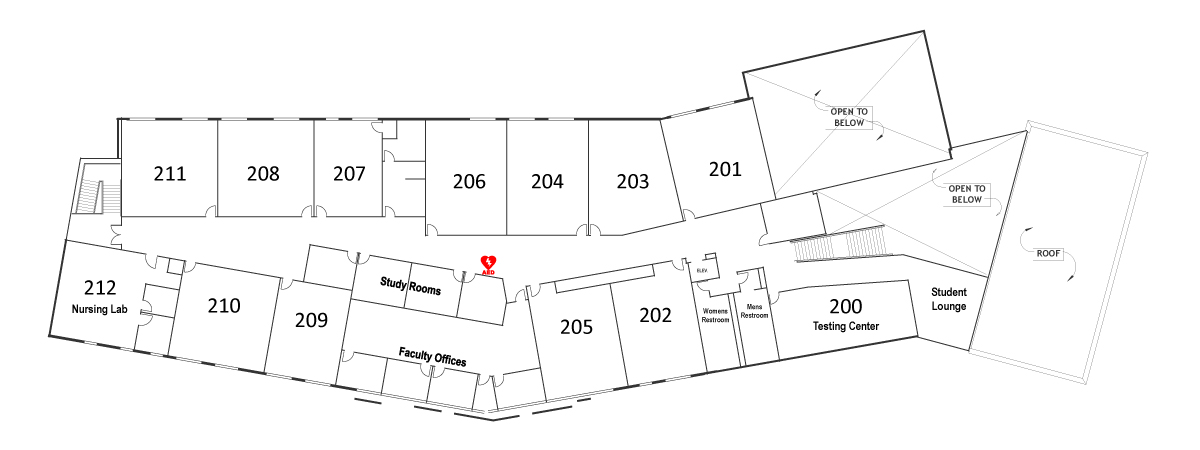
The Behavioral Intervention Team (BIT) exists to provide a route of communication, assessment and intervention for behaviors exhibited by members of the college community which, if left unaddressed, could impact the teaching-learning environment. This cross-functional team utilizes a threat-assessment tool provided by the National Behavioral Intervention Team Association (NaBITA) to help determine appropriate courses of action when confronted with reports of such behaviors.
The Behavior Intervention Team also serves as the College's designated Sexual Assault Response Team (SART). The SART responds to issues of sexual assault which have a specific set of requirements and responses that must be met. It is our hope that no one within our campus community will become a victim of sexual assault. However, if it occurs, the College's SART was created to meet victim needs.
What behaviors should I refer to the BIT/SART?
- Erratic behavior (including online activities) that disrupts the mission and/or normal proceedings of students, faculty or staff
- Instances of sexual or dating violence
- Implication or direct threat of harm to themselves or others
- The display of what is perceived as a weapon
- Physical or verbal confrontation and/or attack
- Stalking or harassment of a faculty member, staff member or student
- Delusional thinking, hallucinations or psychotic behavior
- Threatening, aggressive or hostile verbalizations or correspondence (email, letters, voicemail, etc.)
- Clearly noticeable changes in behavior, demeanor, dress or personality from what was noted previously as typical or "standard" for that individual
- Any behavior of concern that doesn't fit into the categories above
How to Report to BIT:
Please use the following form to report an incident.
Contact a Team Member:
- Dr. Peggy Chalker
- Dean of Transfer & Articulation and Mt. Orab Campus Director
- 800.628.7722 x2880
- pchalker@sscc.edu
- Gary Heaton
- Security and Emergency Response Coordinator, Central Campus
- 800.628.7722 x2673
- gheaton@sscc.edu
- Dr. Peter Hanson
- Dean of Academic Affairs
- 800.628.7722 x2630
- phanson@sscc.edu
- Thomas Payton
- Faculty, Psychology
- 800.628.7722 x2713
- tpayton@sscc.edu
- Dr. Jessica Wise
- Dean of Instructional Operations and Interim Dean of Student Affairs
- 800.628.7722 x5510
- jwise@sscc.edu
| Hate Offenses | 2024 | 2023 | 2022 |
| Murder/Non-Negligent Manslaughter | 0 | 0 | 0 |
| Sex Offenses (Forcible) | 0 | 0 | 0 |
| Sex Offenses (Non-Forcible) | 0 | 0 | 0 |
| Robbery | 0 | 0 | 0 |
| Aggravated Assault | 0 | 0 | 0 |
| Arson | 0 | 0 | 0 |
| Burglary | 0 | 0 | 0 |
| Simple Assault | 0 | 0 | 0 |
| Motor Vehicle Theft | 0 | 0 | 0 |
| Larceny-Theft | 0 | 0 | 0 |
| Intimidation | 0 | 0 | 0 |
| Destruction/Damage/Vandalism | 0 | 0 | 0 |
| Domestic Violence | 0 | 0 | 0 |
| Criminal Offenses | 2024 | 2023 | 2022 |
| Murder/Non-Negligent Manslaughter | 0 | 0 | 0 |
| Negligent Manslaughter | 0 | 0 | 0 |
| Sex Offenses (Forcible) | 0 | 0 | 0 |
| Sex Offenses (Non-Forcible) | 0 | 0 | 0 |
| Robbery | 0 | 0 | 0 |
| Aggravated Assault | 0 | 0 | 0 |
| Burglary | 0 | 0 | 0 |
| Motor Vehicle Theft | 0 | 0 | 0 |
| Arson | 0 | 0 | 0 |
| Arrests | 2024 | 2023 | 2022 |
| Liquor Law Violations | 0 | 0 | 0 |
| Drug Law Violations | 0 | 0 | 0 |
| Weapons, Carrying, Possessing, etc. | 0 | 0 | 0 |
668.46 Jeanne Clery Disclosure of Campus Security Policy and Campus Crime Statistics Act
Annual security report information as defined in 34 CFR Sec.668.46 is distributed annually by October 1. This information is available at Annual Security Report, by contacting the Records Office, or by visiting Campus Crime Statistics.
The following information will help you prepare for emergencies in the classroom.
- Classroom Emergency Preparedness and Response Information
- This resources contains information on how to report an emergency or suspicious activity, what to do in the event of a lockdown or evacuation and personal safety tips.
Alcohol & Drug Policies
Students who drink or use illegal drugs on campus will experience far-reaching effects on their academic and personal lives. Students who abuse alcohol or drugs will suffer from impairment of their decision-making abilities which in turn may result in unintended behavior and consequences such as:
- injuries or death;
- missing classes;
- unintended sexual activity; or
- violence and vandalism.
Alcohol Policy
The laws of the state of Ohio forbid the sale or serving of alcoholic beverages to persons under 21 years of age. Persons 21 or older who have a valid Ohio driver’s license may be served. The law also forbids misrepresenting one’s age for the purpose of consuming or purchasing alcoholic beverages. It is the intention of this policy to promote attitudes toward alcohol use that are consistent with the goal of learning to take responsibility for one’s life and learning to work in the thoughtful community with others.
The following general policy statement is designed to: 1) be consistent with the laws of Ohio; 2) stress moderation, safety and individual accountability for those who choose to drink; 3) work towards a college atmosphere that is free of coercion for those who choose to drink; 4) maintain a community where alcohol abuse and its effects are minimal; 5) provide information and education for all students and 6) provide confidential and effective guidance and counseling for those with special needs related to alcohol use and alcoholism.
This policy was developed by the Disciplinary Committee made up of representatives from the student body, faculty, institutional support staff and the administration. It has been reviewed by the President's Council and approved by the Board of Trustees. All members of the Southern State community are expected to be familiar with and abide by the principles and details of this statement.
The sale, acquisition, possession, transportation and consumption of alcoholic beverages are governed by various statutes of Ohio and regulations of the Alcoholic Beverages Control Commission. In general, some of the pertinent statutes and regulations provide that:
- No person or group shall sell, deliver, purchase or otherwise procure alcoholic beverages for consumption by a person under 21 years of age. Violators are subject to arrest, criminal charges, fines and imprisonment.
- No person shall use the driver's license or other identification of another or permit such identification to be used by another, or allow or deface any cards in order to procure alcoholic beverages. Violators are subject to arrest, criminal charges and fines.
- No person shall operate a motor vehicle while under the influence of alcoholic beverages. Violators are subject to arrest, fines, mandatory court education programs, loss of license and/or imprisonment.
- No person who is intoxicated shall be served an alcoholic beverage on licensed premises. Violators are subject to fine and possible disciplinary action from the local licensing authority.
- No person under 21 years of age shall transport, purchase, sell, deliver, possess or receive or otherwise procure alcoholic beverages except in the course of employment. Violators are subject to arrest, criminal charges, fines and imprisonment.
In addition to state laws, local ordinances prohibit the possession of open containers of alcohol on county property (buildings, parks, etc.).
The serving of alcoholic beverages on campus is prohibited.
Drug Policy
The college upholds the federal and state laws prohibiting the use, possession, sale or offering for sale of controlled substances, including but not limited to marijuana, and will not interfere with the legal prosecution of any members of the community who violate such laws. Law enforcement officers, when armed with the proper documents, have a legal right to search any and all buildings on the campus without prior notice.
Guidelines for Implementation of the Alcohol & Drug Policies
Southern State’s policy on alcohol and alcohol related behavior stresses the concept of individual responsibility.
The purpose of these implementation guidelines is to summarize and clarify some institutional strategies to help students assume their responsibilities under the law.
Each individual should be aware of the state and local laws and is responsible for their own decisions and actions and for any consequences of them. The legal requirements, as well as the college alcohol and drug policies, will be communicated to students in the following ways:
- In writing, in the college policy manual and posted in the student center
- Verbally, during orientation
The following types of concerns would warrant intervention by staff or Dean of Student Affairs:
- Individuals demonstrating problem drinking patterns (this includes problems leading to or resulting from the irresponsible use of alcohol)
- Individuals making irresponsible choices and decisions that could endanger themselves and others due to the influence of drugs or alcohol
- Individuals whose alcohol and/or drug related behavior infringes on the rights of others
- Individuals possessing or using drugs
Interventions may be made in either or both of the following directions:
- 1. Accountability
- The implications of the individual’s or organization’s behavior will be discussed with them by the Dean of Student Affairs.
- If the situation persists, the individual or organization may be referred to the Disciplinary Committee and/or the Dean of Student Affairs.
- Serious problems can be referred immediately to the Disciplinary Committee.
- The Dean of Student Affairs retains the general authority in dealing with students.
- 2. Help/Support
- The individual may be referred to Counseling Resources.
- The individual may be referred to support groups such as AA, Al-Anon, etc.
- The individual may be referred to any other appropriate resource in the community.
An educational program will be developed, implemented and coordinated by Counseling Resources.
Additional Local Resources
- Adams/Brown County
- Counseling Center
- 829 East Walnut St
- West Union, OH 45693
- 937.544.5218
- Clinton County
- Solutions Community Counseling and Recovery Center
- 953 S South St
- Wilmington, OH 45177
- 937.383.4441
- Fayette County
- Fayette Recovery Center
- 5 Fayette Center
- Washington CH, OH 3160
- 740.335.8228
- Highland County
- Scioto Paint Valley Mental Health Center
- 108 Erin Court
- Hillsboro, OH 45133
- 937.393.9946
Drug-Free Policy
The unlawful possession, use, or distribution of drugs and/or alcohol by students or employees on college property or as a part of any college activity is prohibited. Violators will be prosecuted in accordance with applicable laws and ordinances and will be subject to disciplinary actions by the college, in conformance with the Southern State Community College Student Code of Conduct, Alcohol Policy, and/or Drug Policy. Sanctions for violations may include suspension, and/or termination/dismissal, as well as compulsory attendance at drug/alcohol education programs or other appropriate disciplinary measures.
Public use of College Grounds
Purpose
The purpose of the Policy is to promote the free exchange of ideas and the safe and efficient operation of the College by:
- Fostering free speech, assembly and other expressive activities on College property by all persons, whether or not they are affiliated with the College.
- Maintaining an appropriate educational and work environment for all persons present on College property, including but not limited to students, faculty, employees, customers and visitors.
- Maintaining the personal security of all persons present on College property and protecting the property of the College and of persons present on College property.
In developing this Policy, the College recognizes the constitutional freedoms guaranteed by the United States and Ohio Constitutions, including freedom of speech, press and assembly. The College also recognizes the need to preserve and protect its property, students, guests and employees of the College, and to ensure the effective operation of educational, business and related activities of the College. Expressive activities on the College's campus may be subject to reasonable regulation with regard to the time, place and manner of the activities. College employees will not consider the content of expressive activities when enforcing this Policy. No Policy can address every possible activity or situation that may occur on College property, and the College reserves the right to address such situations as circumstances warrant.
This Policy does not apply to use of College facilities and grounds for official events sponsored by the College. Expressive activities carried out under this Policy shall not be considered to be speech made by, on behalf of or endorsed by the College. This Policy supersedes any provisions in any other earlier-adopted College policies that address similar or overlapping issues, such as use of outdoor spaces.
Outdoor Areas of Campus Generally Available for Use
General Access
Any person or group may use, without prior notification, any publicly accessible outdoor area of the College's campus except parking lots, garages and driveways. Federal, state and local laws will be enforced as applicable. The use of walkways or other common areas may not block the free passage of others or impede the regular operation of the College. Use of the general access areas may include speaking, non-verbal expression, distributing literature, displaying signage and circulating petitions. There is no limit to the number of times a month a person or group may access those areas. During work and class hours or if the area is currently in use for an official College event, amplification may be restricted if it unreasonably interferes with College operations or noise ordinances are violated.
Off-campus Locations
The College's off-campus locations are leased facilities and not owned by the College. Those facilities generally do not include any outdoor space leased or controlled by the College, therefore, no publicly-accessible outdoor areas available for use under this Policy. Where any outdoors space is controlled by the College, this Policy applies.
Large Groups
Except in circumstances described below, any person or group whose use of an outdoor area is expected or reasonably likely to have more than one hundred people must notify the Campus Director at least two (2) business days before the day of the expressive activity, including information as to the specific location to be used for the event and the estimated expected number of persons, and the name and contact information of at least one person who can be contacted regarding logistics of the event, which shall include at least one person who will be personally present. Security and clean-up costs will not be charged to the person or group.
Prior notice is necessary to ensure that there is sufficient space for the large group event, that the large group event does not conflict with any other scheduled use of the outdoor space, and that sufficient College resources are available for crowd control and security. If such advance notice is not feasible because of circumstances that could not be reasonably anticipated, the person or group shall provide the College with as much advance notice as circumstances reasonably permit.
Student Use
In addition to the general right of access to outdoor areas of campus described above, any student or student organization may seek to reserve the use of specific outdoor areas by contacting the Campus Director. Any request by a student or student organization to reserve such area or space shall be made at least one (1) business day prior to the event. A request will be granted unless it would conflict or interfere with a previously scheduled event or activity or violate this policy.
A student or student organization that has reserved a specific area or space under this policy will have priority over any other persons seeking to use the area or space during the scheduled time period. Any decision denying a request shall be promptly communicated in writing to the requester and shall set forth the basis for the denial. The content of the anticipated speech or other expressive activity shall not form the basis for a denial.
Prohibited Activities
1. Any event or activity that disrupts the ability of the College to effectively and peacefully teach students, provide client services, or conduct any of its other business and support operations is prohibited. Examples include but are not limited to excessive noise, impeding vehicle or pedestrian traffic, and conduct otherwise unlawful.
2. No activity may damage College property. Prohibited actions include but are not limited to driving stakes or poles into the ground, hammering nails into buildings, and attaching anything to sidewalks, paved areas, or any part of any building, structure or fixture.
3. Distribution/solicitation by placing any material on vehicles in the parking lots or garages is prohibited. Leaving trash, litter, materials or pollutants in any area is prohibited.
Enforcement
The Campus Directors and local law enforcement shall enforce the provisions of this Policy. Any person who violates Section D of this Policy may be subject to an order to leave College property. Employees in violation of this Policy may be subject to discipline, up to and including termination.
Dispute Resolution
Any person or recognized student organization who believes unlawful, unreasonable, or arbitrary limitations have been imposed on any of their speech or other expressive activities under this Policy may file a complaint with the Dean of Student Affairs.
Procedures
The President may adopt procedures to administer this policy.
Southern State offers workshops on rape prevention, alcohol and drug prevention, alcohol and drug abuse and self-defense on an annual basis. Throughout the year, the college provides informative literature on these topics at each campus. The college provides a directory of off-campus counseling, mental health and recovery service agencies that are available to students and employees through the Dean of Student Affairs office.
Southern State also offers counseling on every campus through Counseling Resources.
House Bill 180 (21st General Assembly) concerning the registration of sex offenders and community notification of registered sex offenders went into effect July 1, 1997. The law, commonly known as Megan's Law, requires certain sex offenders to register with the Sheriff in the county in which they reside. The Sheriff must notify the College of any such registrations.
The Campus Sex Crime Prevention Act went into effect on October 28, 2002. This federal law provides for tracking of convicted, registered sex offenders enrolled as students at institutions of higher education, or working or volunteering on campus. This act amends the Jacob Wetterling Crimes against Children and Sexually Violent Offender Registration Act. Southern State Community College is notified by mail about individuals registered as sexual predators and individuals registered as habitual sex offenders with community notification.
The website utilized for the State of Ohio is: http://www.icrimewatch.net/index.php?AgencyID=55149&disc
Individuals seeking further information about these laws, or the notifications made to the College in accordance with these laws, should contact Peggy Chalker at (937) 393-3431 x2880.
All crimes should be reported immediately to the police/sheriff's department. Victims also need to file an incident report with the Director's Office on any campuses or with the Dean of Student Affairs on central campus. Submitted reports will be used to compile the annual campus crime report.
This report will be kept confidential.
Emergency
For any emergency on or off campus, call 911 immediately.
Non-Emergency
- Central Campus
- Director
- 800.628.7722 x2530
- Hillsboro City Police
- 937.393.3411
- Brown County Campus
- Director
- 800.628.7722 x3510
- Mt. Orab Police
- 937.444.2281
Crimes reported to counseling centers are confidential by law. Some off-campus reports may also be legally confidential (e.g., to clergy, social agencies and local hospitals). Reports that are confidential by law will not be reported to Southern State for inclusion in our annual crime statistics report.
Southern State will make every attempt to distribute timely warnings. Warnings will be issued in the event that a situation arises, either on or off campus that, in the judgment of the Dean of Student Affairs, constitutes an ongoing or continuing threat to the campus community.
Timely warnings are distributed through SSCC ALERTS. SSCC Alerts is a comprehensive alert notification system that Southern State uses for broadcasting important information such as campus emergencies, closures, delays, cancellations, outages, and more via email, text, or voice message.
Sexual Harassment Policy
It is the policy of Southern State to provide employees and students with an environment free from sexual harassment. Sexual harassment is a violation of both state and federal law, and the college will not tolerate any employee or student, male or female, sexually harassing another individual, whether employee or student, in any way. The Sexual Harassment Policy and Procedures can be found at the link below.
Sexual Offense Procedures
Southern State offers preventative workshops for sexual offenses to promote awareness and prevention of sexual assault. In addition, printed literature is available at each campus location.
In the event a sexual offense should occur, victims are strongly encouraged to report the incident to the police/sheriff’s department. College personnel will assist students as requested in notifying the proper authorities. The victim should not change clothes or otherwise cleanse her/himself before going to a hospital in order to preserve physical evidence that may be needed for investigation and prosecution. If the victim is reluctant to contact the police/sheriff’s department initially, she/he should still seek treatment at a hospital to preserve evidence and address any health concerns.
Victims that want to request a change in their academic situation may do so by contacting the Vice President of Academic and Student Affairs.
It's scary to think about, but an active shooter can strike any place, at any time. For this reason, Southern State has provided this 'Run. Hide. Fight' video to educate our campus community. Your safety is our number one priority so please take a moment to watch.
Unless otherwise authorized by law, no person shall knowingly possess, have under the person’s control, convey or attempt to convey a deadly weapon or dangerous ordinance onto the premises of any Southern State campus.

